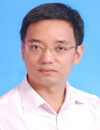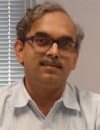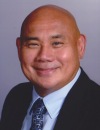Manish BiyaniAssociate Professor, Japan Advanced Institute of Science and Technology Dr Manish Biyani received the ME (2001) in Bioengineering and PhD (2004) in Biological Science from Saitama University, Japan. Acquiring higher education in Japan, Dr Biyani built a career in the field of Biotechnology and was invited as Research Scientist to join two major national projects of JST (Japan Science and Technology), CREATE and CREST, for 10 years from 2004 to 2013, where Dr Biyani used nanobio-device tools to develop high-speed molecular evolution reactor for screening novel and highly-functional bio-molecules and bio-drugs. Dr Biyani also appointed as staff (Res. Assistant Professor) in the Department of Bioengineering at The University of Tokyo from 2009-2013. In 2014, Dr Biyani is invited to join Hokuriku Life Science Cluster (HLSC) project and appointed as staff (Res. Associate Professor) in Japan Advanced Institute of Science and Technology. |
Jason HeikenfeldProfessor and VP Operations, UC Office of Innovation, University of Cincinnati Jason Heikenfeld is VP of Operations at the Univ. of Cincinnati Office of Innovation. He also directs the Novel Devices Laboratory, an internationally leading lab in electronic display technology, microfluidics, electronic paper, and most recently minimally invasive biosensing technology. In the first decade of his career, Jason Heikenfeld is VP of Operations at the Univ. of Cincinnati Office of Innovation. He also directs the Novel Devices Laboratory, an internationally leading lab in electronic display technology, microfluidics, electronic paper, and most recently minimally invasive biosensing technology. In the first decade of his career, Dr. Heikenfeld had already accumulated the most patents and licensees of any faculty member in the history of the Univ. of Cincinnati. He is a serial entrepreneur, and one of his recent startups, Eccrine Systems, has been recognized as a top 50 global startup by Bloomberg. In addition to his scholarly work, during his teaching years Prof. Heikenfeld was the highest-rated STEM educator at the University of Cincinnati. |
Norbert KleinProfessor, Imperial College London Dr Norbert Klein received his PhD in Physics from University of Wuppertal and his Habilitation in Physics from Technical University of Aachen in Germany. Since 2009 he is full Professor and Chair in Electromagnetic Materials and Sensors at Imperial College London http://www.imperial.ac.uk/people/n.klein and Director of Imperial’s Centre of Terahertz Science and Engineering https://www.imperial.ac.uk/terahertz . Before 2009, Prof. Klein was division leader for Electromagnetic Sensors at Juelich Research Center in Germany. He is (co)author or more than 180 peer-reviewed scientific papers and book articles and is key inventor in more than 15 European and US patents related to microwave devices for sensor- and communication applications. In 2007 Prof. Klein founded the spin-off company EMISENS www.emisens.com which has successfully commercialized a microwave bottle scanner for airport passenger checkpoints, and he still holds the post of CTO. His main current research interest is the implementation of microwave and terahertz technology and 2D materials in lab-on-chip systems for medical diagnostics. |
Paul LiProfessor, Simon Fraser University Dr. Paul Li obtained his Ph.D in analytical chemistry at the University of Toronto in 1995. Then he developed the microfluidic lab-on-a-chip at the University of Alberta during his postdoctoral work. Dr. Li joined Simon Fraser University in 1999, and he was promoted to full professor in 2010. Dr. Li is interested in integrating microfluidics for single-cell analysis in order to study the transport kinetics of chemical compounds (from herbs) on cancer single-cells. This study is particularly useful for characterizing multidrug resistant (MDR) cancer cells, leading to potential improvement in cancer medicine. He is also interested to combine microfluidics with the nucleic acid bioarray for detection of low volumes and low concentrations of fungal pathogenic DNA, KRAS cancer gene DNA, and influenza viral RNA. Dr. Li has published several books, namely“Fundamentals of lab on a chip for biological analysis and discovery” in 2010, and “Microarray Technology: Methods and Applications” in 2016. He is associate editor of Canadian Journal of Pure and Applied Sciences, and sits on the editorial boards of Journal of Proteomics and Genomics and Hong Kong Pharmaceutical Journal. Dr. Li is keynote speaker of several major international conferences. He is inventor of 4 granted patents and 5 pending patents, and founder of ZellChip Technologies Inc. specializing in microfluidic-based instruments for life science applications. |
Marya LiebermanProfessor, University of Notre Dame Dr. Marya Lieberman is a surface and analytical chemist with over 60 peer-reviewed papers in the area of molecular electronics, DNA nanostructures, and low-tech analytical methods. She studied chemistry at MIT, obtained her doctorate in inorganic chemistry at the University of Washington, Seattle, and was a postdoc at the California Institute of Technology. Her current research focuses on paper millifluidic devices for chemical analysis in low-resource settings. These robust, inexpensive, and easy-to-use test cards help people solve problems outside the laboratory. Applications include detection of falsified and substandard medicines, monitoring nutritional supplement quality and population nutrition status, presumptive identification of illicit drugs, and evaluation of toxins in the environment. |
Jin-Ming LinProfessor, Tsinghua University Professor Jin-Ming Lin graduated from Fuzhou University in 1984 and received a PhD at Tokyo Metropolitan University in 1997. He had studied and worked in Showa University and Tokyo Metropolitan University during 1992-2002. He was selected as “100 Talented Researcher Program” for Chinese Academy of Sciences, and obtained the Fund for Distinguished Young Scholars of National Natural Science Foundation of China at 2001. He had been a full professor in Research Center for Eco-Environmental Sciences, Chinese Academy of Science during 2002-2004. He is currently a full professor of Department of Chemistry, Tsinghua University since 2004, and was selected as Cheung Kung Scholars Professor of Ministry of Education, China at 2008. He is a Fellow of Royal Chemical Society, a vice president of Chinese Society of Mass Spectrometry, a General Secretary and deputy director of the Committee of Mass Spectrometry in Chinese Chemical Society, and service as associate editors for Chinese Chemical Letters, Luminescence, Trends in Analytical Chemistry, and Current Analytical Chemistry, and as editorial boards for ten international journals. He is the author and co-author of 418 original research papers published in international journals, 45 reviews, 4 books and 48 patents. |
Soumyo MukherjiProfessor, Indian Institute Of Technology Bombay Soumyo Mukherji did his B.Tech. in Instrumentation Engineering, Indian Institute of Technology (Kharagpur), MS in Mechanical Engineering, Colorado State University (Fort Collins, USA) and Ph.D. in Biomedical Engineering, University of North Carolina (Chapel Hill, USA). He joined IIT Bombay right after his PhD in 1997 as an Assistant Professor and is now a Professor in the Department of Biosciences and Bioengineering . He was the Head of the Centre for Research in Nanotechnology and Sciences at IIT Bombay from 2010-2013. |
Danilo TagleDirector, Office of Special Initiatives, National Center for Advancing Translational Sciences at the NIH (NCATS) Dan Tagle is Director of the Office of Special Initiatives at NCATS where he many coordinates efforts towards development of disruptive technologies in translational research. He obtained his Ph.D. in Molecular Biology and Genetics from Wayne State University School of Medicine. He was an NIH National Research Service Award postdoctoral fellow in Human Genetics at the University of Michigan. He has served on numerous committees, advisory boards, and editorial boards. He has authored many scientific publications and has garnered numerous awards, including more recently the Roscoe O. Brady Award for Innovation and Accomplishment, and the Henry J. Heimlich Award for Innovative Medicine. |
An-Bang WangDistinguished Professor, Institute of Applied Mechanics, National Taiwan University He is honored as distinguished professor at National Taiwan University since 2020. He became a full professor of the Institute of Applied Mechanics, National Taiwan University in 2001. In the period from 2002 to 2004, he served as the director of Optomechatronics Education Resource center, Ministry of Education, Taiwan, ROC. From 2004 to 2008, he served as the chairman of the display technology Education Program and counselor of advisory office, Ministry of Education, Taiwan, ROC. He has been honored with the 2013 Distinguished Engineering Professor Award granted by Chinese Institute of Engineers (CIE), Taiwan, ROC. From 2014 to 2016, he was elected as vice president of International Society of Coating Science and Technology. His current research interests include advanced coating & 3D-printing technology, microfluidic platform for biomedical and industrial applications, display & optomechatronic systems, and biomimetics. |




